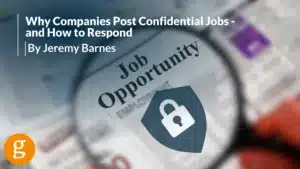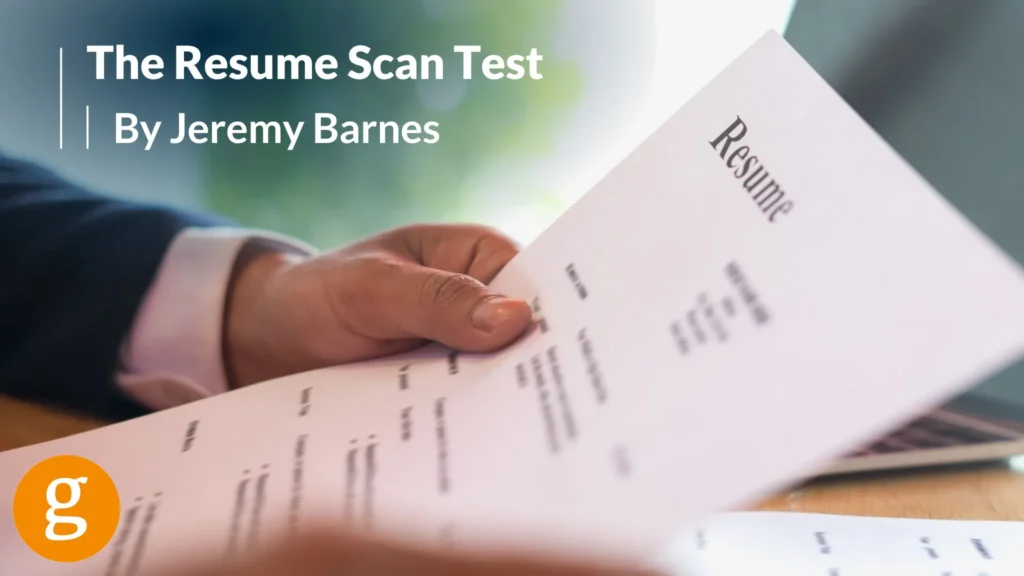Why Companies Post Confidential Jobs – and How to Respond
Jeremy Barnes | Career Tips, Opinion, Recruiting Career Advice | July 17, 2024

As a talent recruiter, I hear a lot of commentary from job candidates in response to confidential job postings from employers – meaning the company name is not revealed in the job ad. Often, candidates have mixed reactions. While some candidates involved in a job search immediately assume employers have good reasons for keeping their brands confidential, other job seekers assume a confidential job listing is a red flag regarding the hiring company. Both possibilities can be true. And there are other probabilities.
First, it’s natural for job candidates to have questions when they see a confidential job listing. They of course need information to decide whether they want to pursue the position. It’s certainly possible that a company might post a position confidentially because they recognize they have a poor reputation in the market. But there are several legitimate and far more likely reasons a company may want or need to do this.
I’d like to shed light on the reasons most companies choose to post confidential job listings, and how job candidates can respond – or not – to these talent searches.
5 reasons employers post jobs confidentially
- Pending termination of a team member who holds an essential role: Talent acquisition can be complex. Companies can find themselves in situations where an underperforming team member must be replaced. However, removing that team member before a successor is determined could cause greater harm to workflows and the business than the team member’s poor performance. In these situations, a confidential talent search allows the company to begin securing a replacement without the current employee learning of the situation or causing their performance to further deteriorate.
- Protecting a confidential business strategy: If a company is launching a new product line, expanding into new territory, acquiring a competitor, or opening a new subsidiary company, they may likely require additional talent with specialized skills and experience. However, making these needs public gives away valuable information to competitors, and in general, it discloses proprietary information the company is not ready to make public. It’s better to post a position confidentially and let the competition and market find out when the details become public.
- Avoiding market and team concerns when key team members resign or retire: There will always be key people on a team whose departure will create ripple effects within the company, among customers, or possibly in the market at large. When a key figure decides to move on or retire, companies rarely want the departure to become public until a successor has been determined. Confidential job listings minimize shock and uncertainty for other team members, as well as customers, investors, and business partners.
- Steering clear of overwhelming their hiring teams: Many companies have such strong brand reputations that job candidates are extremely motivated to join their teams. Public job postings from these elite brands can easily overwhelm hiring teams with a flood of unqualified candidates hoping to be hired – and even unwanted follow-up inquiries from candidates who are qualified. Sudden inundation slows the entire hiring process, delaying hiring managers in finding the talent they need to accelerate their businesses.
- Protecting current team members: A few weeks ago, my son’s daycare posted a position for a new daycare director, and it caught me by surprise. We love Ms. Bobbie and have zero desire to see her leave. A couple of days later, I realized the job posting was for another branch of the daycare – not intended to replace our director. For companies with more than one location in a particular region, an existing employee may see a job posting with their title and assume the position that’s being eliminated is theirs, or that they are being replaced. And I’m proof that customers can also be alarmed. These are valid reasons a company may choose to keep a job posting confidential, to avoid scaring or unsettling team members into thinking their job is on the line.
As a candidate, how do you respond to confidential jobs?
- If a confidential search is posted by a recruiting firm, fully check them out before giving them your information: Professional recruiting firms will handle your search information confidentially as well, but it’s important to ensure you’re dealing with a reputable firm. Goodwin Recruiting has been in business for 25 years, has an A+ rating with the Better Business Bureau, is recognized as a Forbes Best Recruiting Firm, and has nearly 300 recruiters coast-to-coast who serve our clients and job candidates. We have a standing policy to never release a candidate’s resume to any client without the candidate’s consent. Not all recruiting firms operate with the same standards, so be sure you know who is on the receiving end of your information.
- Search for keywords or phrases in the job posting: More than once in my career, I have searched a few keywords or phrases within a confidential job posting and based on information in the job description or small ‘tells’ about the company culture or industry, I was able to determine the company that posted it.
- If you’re unemployed and looking for a new job, you have nothing to lose by submitting a job application: Applying for a confidential position with a potential employer does not obligate you to even attend the job interview. If you discover the role is with a company that doesn’t align with your interests or values, you can politely decline the interview.
- If a recruiter contacts you about a confidential role, it’s likely safe for you to move forward: When this happens, it’s most often the case that recruiters are already familiar with the candidates they approach. So, if a recruiter reaches out to you, they have almost certainly seen your resume and wouldn’t be calling if the role is for your current employer. However – and again – if you’re unfamiliar with the firm, be sure to validate their reputation.
- If you’re currently employed and don’t want your employer to know your intentions, avoid applying to confidential roles: The only time a confidential search can be dangerous to a candidate is when you’re currently working. You do not want to accidentally apply to your current employer!
Make a confidential connection with an expert recruiter
Whether you are an employer needing to begin a confidential talent search or a job candidate who is interested in one of the confidential positions listed on our job board, feel free to reach out to me today. I am a DEI-certified senior recruiting partner with Goodwin Recruiting and can help accelerate your search.
Share This Article






































